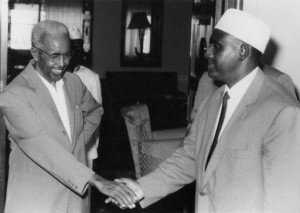Independent Somalia: the state that never was

Bartamaha (Nairobi):- When Virginio Bresolin passed away recently in Merka, a coastal Somali city run by Al Qaeda-inspired rebels, so did the last of a generation of Italians who emigrated under Mussolini.
He worked as a blacksmith, spoke fluent Somali and rusty Italian, and few people noticed when he died.
Fifty years after independence, indifference characterises how most feel about the former colonial ruler of Somalia, a country where 60 percent of the population is under 18 and 80 percent has known nothing but conflict.
Abdullahi Halane Mohamoud, a 62-year-old Merka resident, hardly takes issue with the Italians invading in the first place but only seems to regret that there wasn’t more in it for Somalis.
“Italian colonisation only used people as servants and never provided proper education opportunities. Most people who lived during that time were left illiterate,” he said.
Somalia’s independence started comparatively well and in 1967 even produced the first post-colonial African leader to step down gracefully.
Adan Abdulle Osman accepted his electoral defeat, transferred power to Abdirashid Ali Sharmarke and retired to his farm near Merka, where he died in 2007, aged 99.
The handover ceremony took place in the garden of Villa Somalia, the former residence of Italian colonial governors and now the fortified redoubt from which the country’s Islamist president is battling even more Islamist rebels.
Somalia has been mired in violence for three decades and is now best known to the outside world for being the place that inspired the Hollywood war movie “Black Hawk Down” and the reason the term “failed state” had to be coined.
Like any colonisation, Italy’s left scars in Somalia too.
One instance of colonial oppression vividly remembered by many older Somalis is the construction of a canal still known as Asayle — a Somali world for a mourning veil — in reference to the men decimated by forced labour there.
“My uncle worked there and has told me harrowing tales. He used to say that officers would trample on their backs when crossing the water channel to avoid the mud,” said Mohamed Abdi Elmi, 56.
But Somalia’s case was very different from most others on the continent, as evidenced notably by the nation’s “three independences”.
In November 1949, Somalia was granted independence by the United Nations but placed under an Italian-led trusteeship.
On 26 June 1960, the northern protectorate of Somaliland acquired independence from Britain. Five days later, Italian Somalia became fully independent and merged with Somaliland.
But the lack of a founding liberation struggle left the country without an experienced political class.
President Sharmarke — whose son is the current prime minister — was assassinated in 1969, then Mohamed Siad Barre seized power and thrust his country into the cold war, choosing to side with the Soviet Union.
More than a by-product of colonial times, the deadly chaos that erupted with Barre’s ouster two decades ago is often blamed on a double vacuum.
The cold war ended and with it a system that had propped up Barre’s regime. Simultaneously, Italy’s political order was turned upside down by the Tangentopoli crisis, a nationwide police probe into political corruption.
“The country best equipped to steer Somalia at the time was not able do so. The Italian political class was floundering,” one observer explained.
Italy couldn’t make its voice heard when the world’s new American masters — puffed up with their doctrine of humanitarian imperialism — led the 1992 UN invasion of Somalia.
The disastrous cycle of violence that ensued was interspersed with numerous peace talks, in which Italy’s expertise was overshadowed by US hegemony.
The 2004 transitional federal charter still lists Italian as an official second language but ties between Somalia and its former colonial rulers are withering away silently.
In contrast with the way the British administered their colonies, Italians accounted for half of Mogadishu’s population after World War II.
Conversely, unlike its European neighbours bursting with immigration from the former colonies, Italy is now home to a mere 6,000 Somalis.
By Jean-Marc Mojon
—–
AFP
Comments
comments
 Calendar
Calendar




































